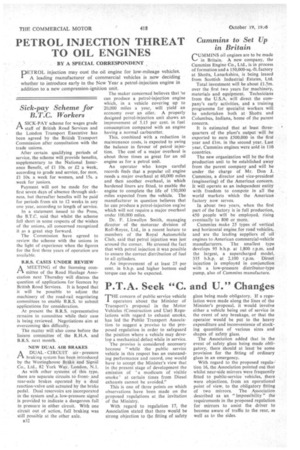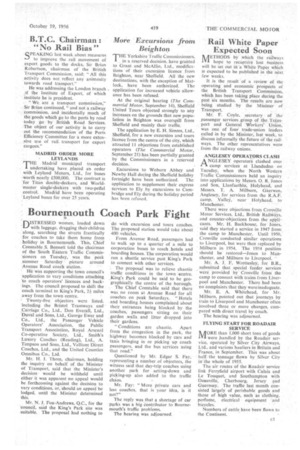PETROL INJECTION THREAT TO OIL ENGINES
Page 38

Page 39

If you've noticed an error in this article please click here to report it so we can fix it.
BY A SPECIAL, CORRESPONDENT ,
PETROL injection may Oust the oil engine for low-mileage vehicles, A leading manufacturer of commercial vehicles is now deciding whether to introduce early in the New Year a petrol-injection engine in addition to a new compression-ignition unit.
Sick-pay Scheme for B.T.C. Workers
A SICK-PAY scheme for wages grade 1-1• staff of British Road Services and the London Transport Executive has been agreed by the British Transport Commission after consultation with the trade unions.
After certain, qualifying periods of service, the scheme will provide benefits, supplementary to the National Insurance Benefit, of £1 10s. or £2 a week, according to grade and service, for men, £1 10s. a week for women, and 15s. a week for juniors.
Payment will not be made for the first seven days of absence through sickness, but thereafter benefits will be paid for periods from six to 12 weeks in any one year, according to length of service.
In a statement, issued to the Press, the B.T.C. said that whilst the scheme fell short in some respects of the wishes of the unions, all concerned recognized it as a great step forward.
The Commission have agreed to review the scheme with the unions in the light of experience when the figures for the first three years of operation are available.
B.R.S. CASES UNDER REVIEW AMEETING of the licensing committee of the Road Haulage Association next Thursday will discuss the question of applications for licences by British Road Services. It is hoped that it will be possible to adjust the machinery of •the road-rail negotiating committees to enable R.R.S. to submit applications for consideration.
At present the B.R.S. representative remains in committee while their case is being reviewed. Negotiations aim at Overcoming this difficulty.
The matter will, also come before the liaison committee of the R.H.A. and B.R.S. next month.
NEW DUAL AIR BRAKES
ADUAL CIRCUIT air pressure braking sysLem has been introduced by the Westinghouse Brake and Signal Co., Ltd., 82. York Way, London, N.1. As with other systems of this type, there are separate circuits to frontand rear-axle brakes operated -by a dual reaction-valve unit actuated by the brake pedal. Dual reservoirs are incorporated in the system and .a low-pressure signal is provided to indicate a dangerous fall in pressure in either circuit. With one circuit out of action, full braking was stilt possible at the other axle.
532 The maker concerned believes that he
can produce a petrol-injection engine which, in a vehicle covering up to 20,000 miles a year, • will yield an economy over an oiler. A properly designed petrol-injection unit shows an improvement of 5.15 per cent, in fuel consumption compared with an engine having a normal carburetter.
This, combined with a reduction in maintenance costs, is expected to swing the balance in favour of petrol. injection. The cost of a major overhaul is about three times as great for an oil engine as for a petrol unit.
An operator who keeps careful records finds that a popular oil engine needs a major overhaul at 60,000 miles and then another overhaul, in which hardened liners are fitted, to enable the engine to complete the life of 150,000 miles expected from the vehicle. The manufacturer in question believes that he can produce a petrol-injection engine which will not require a major overhaul under 100,000 miles.
Dr. F. Llewellyn Smith, managing director of the motorcar division of Roll-Royce, Ltd., in a recent lecture to members of the Royal Automobile Club, said that petrol injection was just around the corner. He stressed the fact that with petrol injection it was possible to ensure the correct distribution of fuel to all cylinders.
An improvement of at least 25 per cent, in b.h.p. and higher bottom end torque can also be expected.
Cummins to Set Up in Britain
rummiNs oil engines are to be made
in Britain. A new company, the Cummins Engine Co., Ltd., is in process of formation and a 150,000-sq.-ft.factory at Shotts, Lanarkshire, is being leased from Scottish Industrial Estates, Ltd.
Total investment will be about £1.m. over the first two years for machinery, materials and equipment. Technicians from the U.S.A. will direct the company's early activities, and a training programme for specialist workers will be undertaken both at Shotts and Columbus, Indiana, home of the parent concern.
It is estimated that at least threequarters of the plant's output will be exported to earn £500,000 in the first year and £1m. in the second year. Last year, Cummins engines were sold in 110 countries.
The new organization will be the first production unit to be established away from the parent company and will be under the charge of Mr. Don L Cummins, a director and vice-president (engineering) of the American concern. It will operate as an independent entity with freedom to compete in all the world markets which the American factory now serves.
In about two years, when the first part of the factory is in full production, 450 people will be employed, rising eventually to 800 or more.
Cummins Make 25 types of vertical and horizontal engine for road vehicles, and are the leading suppliers of oil engines to American commercial-vehicle manufacturers. The smallest type develops 95 b.h.p. at 1,800 r.p.m. and the largest, a supercharged model, 335 b.h.p. at 2,100 r.p.m. Direct injection is employed in conjunction with a low-pressure distributor-type pump, also of Cummins manufacture.
B.T.C. Chairman : "No Rail Bias"
QPEAKING last week about measures to improve the rail movement of export goods to the docks, Sir Brian Robertson, chairman of the British Transport Commission, said: "All this activity does not reflect any animosity towards road transport."
He was addressing the London branch af the Institute of Export, of which institute he is president.
"We are a transport commission," Sir Brian continued, "and not a railway commission, and incidentally much of the goods which go to the ports by road today go by British Road Services. .The object of our activity is to carry out the recommendation of the Ports Efficiency Committee for a more extensive use of rail, transport for export cargoes."
• MADRID ORDER MORE • LEYLANDS
THEMadrid municipal transport . undertaking have placed an order with Leyland Motors, Ltd., for buses worth nearly £500,000. The contract is for Titan double-deckers, and Worldmaster single-deckers with two-pedal control. Madrid have been operating -Leyland buses for over 25 years.
More Excursions from Beighton
THE Yorkshire Traffic Commissioners, . in a reserved decision, have granted to Grant and McAllin, Ltd., modifications of their excursion licence from Beighton, near Sheffield, All the new destinations, with the exception of Matlock, have been authorized. The application for increased vehicle allowance has been refused.
At the original hearing (The Commercial Motor, September 14), Sheffield United Tours objected strongly to any increases on the grounds that new population in Beighton was overspill from Sheffield and mainly their traffic.
The application by E. H. Simms, Ltd., Sheffield, for a new excursion and tours licence from the centre of the city, which attracted 11 objections from established operators (The Commercial Motor, September 21) has been partially granted by the Commissioners in a reserved decision.
Excursions to Woburn Abbey and Newby Hall during the Sheffield holiday fortnight have been authorized. The application to supplement their express Services to Ely _by excursions to Cambridge and Ely during the holiday period has been refused.












































































































